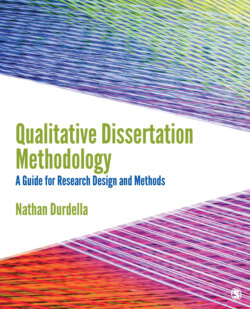Читать книгу Qualitative Dissertation Methodology - Nathan Durdella - Страница 34
На сайте Литреса книга снята с продажи.
Reliability.
ОглавлениеBeing reliable (Roberts, 2004) is related to accessibility—in the sense that someone whom you expect to return email messages will in fact do so. When you request feedback, ask a question, discuss an issue, or have to share thoughts about an experience in the field or on campus, you need a faculty advisor whom you can count on to respond to you. For dissertation research and writing, reliability may also be seen in terms of mutual accountability and demands of quality work on both the part of the advisor and advisee. Conventionally, you would think that your chair functions to hold you accountable for progressing within timelines, meeting submission deadlines, and exceeding standards for research work in the discipline. But this is not always the case. In some advising relationships, students need to demand that their chairs meet or exceed expectations for timeliness and quality: from feedback on chapter drafts to insight on how to present their research work and advice on how to navigate committee hearings. In such cases, you need to persistently advocate for your work: Ask questions about feedback and comments, explore competing or alternative explanations, and consult peers about their experiences. Being in such a position is really not in your best interest—so consider a prospective chair who is there for you to support your research progress.
Advice to Expect From Your Dissertation Chair
For students, the process of socialization into academic life generally occurs throughout the program cycle—so faculty accessibility, reliability, and attitudes have implications for more than just dissertation advising. Over the course of their tenure in the program, students transition along a continuum of identities: doctoral student, scholar-practitioner, scholar-academic. While program advising involves more box checking or, at a minimum, guiding students through a set of tasks to meet program requirements, doctoral students tend to need more than advice about how to complete coursework—including qualitative methods classes—or qualifying exams. While important to meeting degree milestones, program advisement is insufficient to support student socialization into the discipline and qualitative research subfields, growth as scholars and qualitative researchers, and career preparation in the field. The characteristics of a mentoring relationship, in contrast to an advising one, may partially explain this pattern. In fact, advisors typically provide program- and dissertation-level guidance to students, but their work tends to be technical and/or logistical—to get students through a series of events, from coursework to final defense, within prescribed program parameters.
